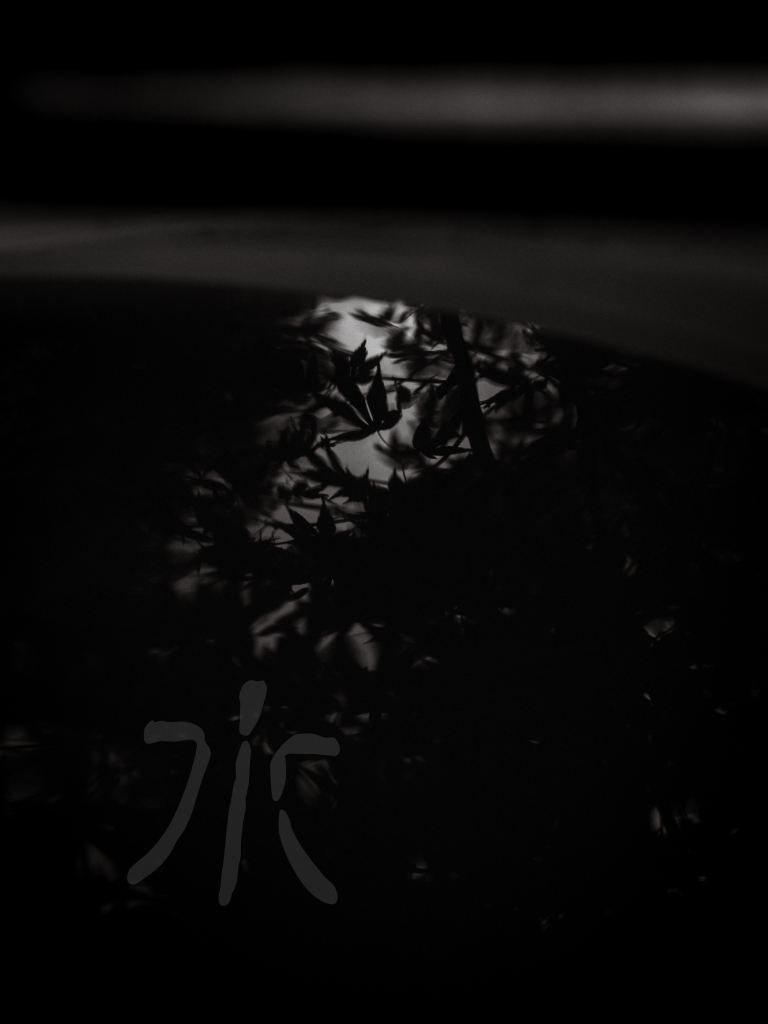
いにしへの
野中の清水 ぬるけれど
もとの心を
知る人ぞ汲む
いにしへの
のなかのしみず ぬるけれど
もとのこころを
しるひとぞくむ
la source au milieu des champs
fraiche il y a longtemps
même devenue tiède
ceux qui connaissent son âme première
y puisent
いにしへ (inishie) : « autrefois, jadis ». Marque la référence au passé.
野中の清水 (nochū no shimizu) : « l’eau claire jaillissant au milieu des champs », image poétique récurrente dans la poésie japonaise (symbole de pureté, de fraîcheur, de constance de la nature).
ぬるけれど (nurukeredo) : « bien qu’elle soit devenue tiède ». On compare l’état ancien (frais) à l’état présent (émoussé, affaibli, devenu tiède).
もとの心 (moto no kokoro) : « le cœur originel, l’esprit d’autrefois ». Référence à la fidélité au sentiment premier, à l’esprit fondateur.
知る人ぞ汲む (shiru hito zo kumu) : « seuls (zo) ceux (hito marque ici un collectif) qui le connaissent viennent y puiser ». kumu : par extension, « saisir le cœur » (omoi o kumu)
trois niveaux de lecture
- champêtre / nature : une source dans un champs, presque une publicité pour eau minérale. mais qui n’a pas vraiment de sens hydrologique car une source ne change pas de température (ou peut-être de façon saisonnière, ce qui ne correspond pas au motif passé/présent du poème).
- métaphorique / fidélité : ceux qui ont connu les qualités (kokoro renvoit à l’âme d’une personne) passées d’une personne lui restent fidèles. continuité, gratitude, morale. une lecture possible serait aussi la critique de cette routine qui n’a plus de sens. le poème loue-t-il la fidélité ou bien en critique-t-il la rigidité ? (une projection très moderne, très occidentale). illustration possible : des anciens élèves qui viendraient voir un maître qui n’aurait plus la même vivacité d’esprit.
- obsédé sexuel français : continuer à boire à la source d’une amante qui aura perdu un peu de sa fraicheur (les implicites érotiques existent dans la poésie de l’époque).
auteur anonyme mais plusieurs sources proches dont une majeure
Kokinshū (古今和歌集, début Xe siècle)
n° 602 (巻第十一・恋五, Livre XI, « Amour V »).
Poème attribué à 紀貫之 (Ki no Tsurayuki, 872–945) :
野中なる 清水を汲みて いつもいつも
元の心を 忘れざりけり
Traduction :
« Puisant l’eau claire au milieu des champs,
jamais, jamais
je n’ai oublié
le cœur premier. »
Ici, l’eau de source = fidélité inaltérable.
C’est probablement le modèle direct du poème du Wakan Rōeishū.
English
the source in the middle of the fields
fresh long ago
even when it has become tepid
those who know its first soul
draw from it
いにしへ (inishie): « in the past, long ago. » Marks the reference to the past.
野中の清水 (nochū no shimizu): « the clear water springing up in the middle of the fields, » a recurrent poetic image in Japanese poetry (symbol of purity, freshness, constancy of nature).
ぬるけれど (nurukeredo): « although it has become tepid. » One compares the former state (fresh) to the present state (blunted, weakened, become tepid).
もとの心 (moto no kokoro): « the original heart, the spirit of former times. » Reference to fidelity to the first sentiment, to the founding spirit.
知る人ぞ汲む (shiru hito zo kumu): « only (zo) those (hito here marks a collective) who know it come to draw. » kumu: by extension, « to grasp the heart » (omoi o kumu).
three levels of reading
rustic / nature: a spring in a field, almost like an advertisement for mineral water. But which does not really make hydrological sense because a spring does not change temperature (or perhaps seasonally, which does not correspond to the past/present motif of the poem).
metaphorical / fidelity: those who have known the past qualities (kokoro refers to the soul of a person) of someone remain faithful to him/her. Continuity, gratitude, morality. Another possible reading would also be criticism of this routine that no longer has meaning. Does the poem praise fidelity or does it criticize rigidity? (a very modern, very Western projection). Possible illustration: former pupils visiting a master who no longer has the same liveliness of spirit.
French sexual obsession: continuing to drink from the source of a lover who has lost a bit of freshness (erotic implications exist in the poetry of the time).
anonymous author but several close sources, including one major
Kokinshū (古今和歌集, early 10th century)
No. 602 (巻第十一・恋五, Book XI, « Love V »).
Poem attributed to 紀貫之 (Ki no Tsurayuki, 872–945):
野中なる 清水を汲みて いつもいつも
元の心を 忘れざりけり
Translation:
« Drawing the clear water in the middle of the fields,
never, never
have I forgotten
the original heart. »
Here, the spring water = inalterable fidelity.
It is probably the direct model of the poem of the Wakan Rōeishū.
日本語
野中の清水
昔は冷たく
今はぬるくなっても
もとの心を知る人が
汲む
いにしへ(inishie):「昔、いにしえ」。過去を指す語。
野中の清水(nochū no shimizu):「野中に湧き出る清水」。日本詩歌における反復的イメージ(純粋さ、冷涼さ、自然の変わらぬ象徴)。
ぬるけれど(nurukeredo):「ぬるくなってしまったが」。かつての状態(冷涼)と現在の状態(鈍化、衰弱、ぬるさ)を対比。
もとの心(moto no kokoro):「元の心、昔の精神」。初めの思いへの忠実、原初の精神を指す。
知る人ぞ汲む(shiru hito zo kumu): 「それを知る人だけが汲む」。ぞ は強調、ひと は集合的。汲む は拡張して「心を汲み取る」(思いをくむ)の意もある。
三つの読み方
田園/自然:野にある泉。まるでミネラルウォーターの広告のよう。しかし泉の水温は変わらない(あるいは季節的に変化するが、それは詩の過去/現在の対比には合わない)。
比喩/忠実:人のかつての徳や心を知る人は、その人に変わらず忠実である。継続、感謝、倫理。もう一つの可能性は、意味を失った習慣への批判。この歌は忠実を称賛するのか、それとも硬直性を批判するのか?(非常に現代的・西洋的な投影)。例:かつての弟子が、もはや同じ活力を持たない師を訪ねる。
フランス的性的執着:少し鮮度を失った愛人の泉から飲み続ける(当時の詩にはエロティックな含意もある)。
作者不詳だが、いくつかの近い典拠があり、その中で主要なのは:
古今和歌集(10世紀初頭)
第602番(巻第十一・恋五)。
紀貫之(872–945)に帰せられる和歌:
野中なる 清水を汲みて いつもいつも
元の心を 忘れざりけり
翻訳:
「野中の清水を汲みて、
いつもいつも
もとの心を
忘れたことはない。」
ここで清水 = 変わらぬ忠実。
和漢朗詠集の歌の直接の典拠である可能性が高い。
中文
田野中的泉水
昔日清凉
即使如今已变得温热
那些知晓其最初之心的人
仍汲取
いにしへ (inishie):「往昔、古时」。表示过去的词。
野中の清水 (nochū no shimizu):「田野中央涌出的清泉」,日本诗歌中的反复意象(象征纯净、清凉、大自然的不变)。
ぬるけれど (nurukeredo):「虽已变得温热」。对比昔日状态(清凉)与现今状态(钝化、衰弱、温热)。
もとの心 (moto no kokoro):「本心、往日之心」。指对初始情感、根本精神的忠实。
知る人ぞ汲む (shiru hito zo kumu):「唯有知晓此心的人才会汲取」。ぞ 强调,ひと 在此为集合。汲む 也可引申为「体察心意」(思いをくむ)。
三种解读
田园/自然:田野中的泉水,几乎像矿泉水广告。但水温并不会真的改变(或仅是季节性变化,不符合诗歌中过去/现在的对比)。
比喻/忠诚:那些了解一个人昔日德行与心灵的人,对其依旧忠诚。连续、感恩、道德。另一种解读是批评这种已无意义的习惯。诗歌究竟是在赞美忠诚,还是在批判僵化?(非常现代化和西方化的投射)。例子:旧日弟子前来探望已不再神采奕奕的师者。
法国式性执念:继续饮用失去些许鲜度的情人之泉(水在当时的诗中常有情色含意)。
作者佚名,但有数个相近典源,其中一个主要的:
《古今和歌集》(10世纪初)
第602首(卷第十一・恋五)。
纪贯之(872–945)所作:
野中なる 清水を汲みて いつもいつも
元の心を 忘れざりけり
翻译:
「汲取田野中央的清泉,
一次又一次,
我从未忘记
最初的心。」
此处清泉 = 不变的忠贞。
这大概是《和汉朗咏集》诗歌的直接范本。

Vous devez être connecté pour poster un commentaire.